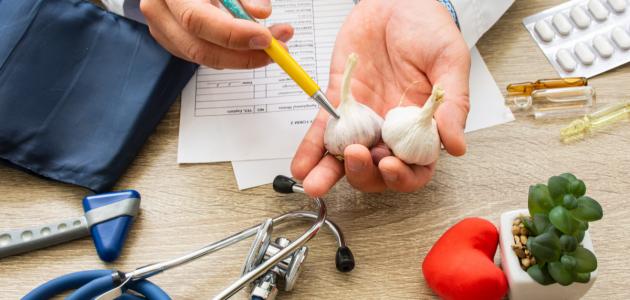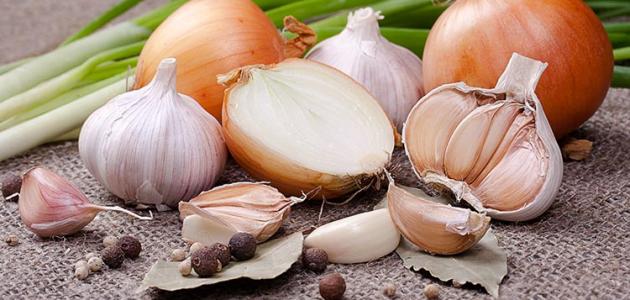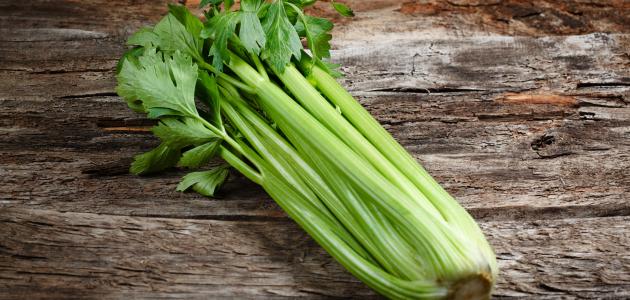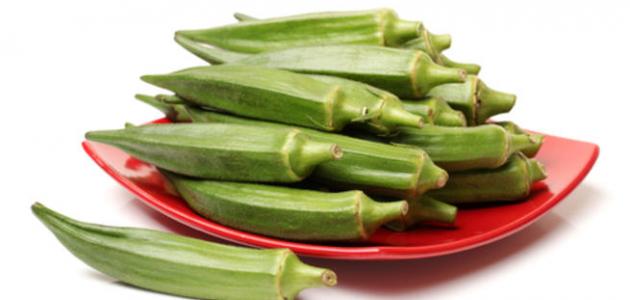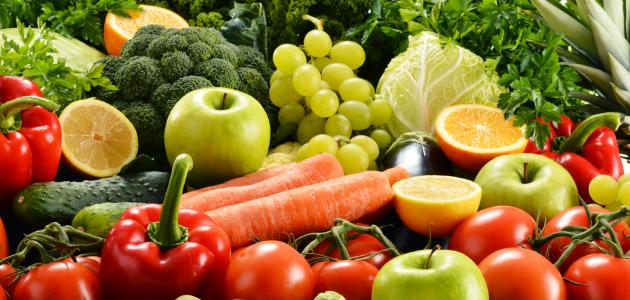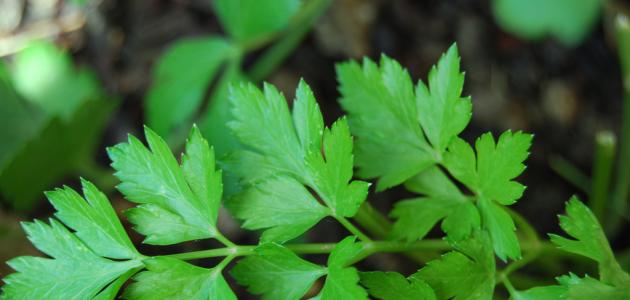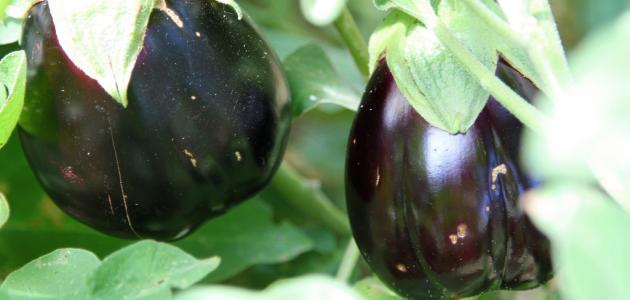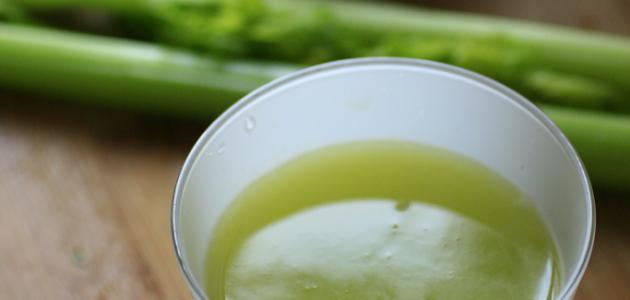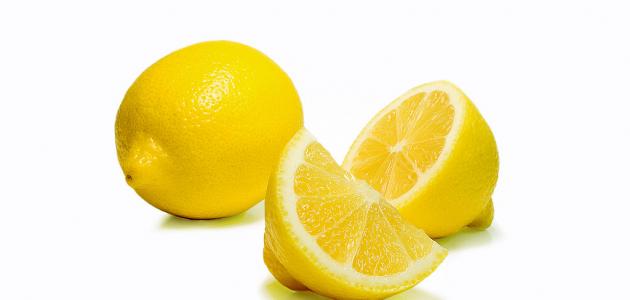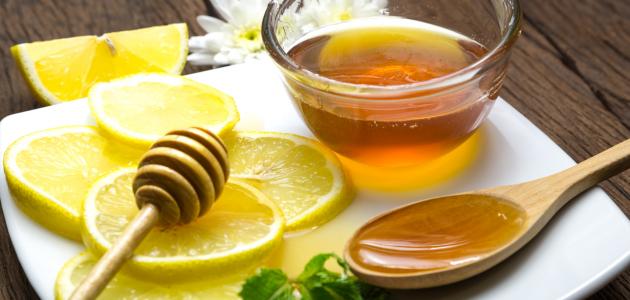Contents
- 1 garlic
- 2 benefits of garlic
- 3 Are there benefits to eating garlic on an empty stomach?
- 4 Bears garlic and its benefits
- 5 The nutritional value of garlic
- 6 Degree of safety and precautions for using garlic
- 7 References
the Garlic
The garlic (scientific name: .Allium sativum L) A species of herbal plants mono monocots that belong to the genus of garlic, and a platoon Althomyat, a plant bulbous, grows in the temperate climate, and a length of 1.2 meters, and has several types, and is the second most prevalent of the genus Althomyat (scientific name: Alliaceae) all over the world, [1] [2] garlic has been used for centuries for cooking, medicine, and is characterized as containing organic compounds of sulfur , which is believed to be the cause of odor and flavor, as it has several benefits Potentially healthy will be mentioned in this article. [3]
There are several different products made from garlic, such as nutritional supplements in the form of grains, and crushed garlic, [4] and you can also obtain garlic oil and vinegar. [5] [6] It is also believed that benefits can be obtained from garlic peels, and although there are no scientific studies to confirm this, a preliminary study published in the Journal of Agricultural and Food Chemistry indicated that the peels contain antioxidant compounds. [7]
The benefits of garlic
Its content of compounds beneficial to health
- Sulfur compounds: It is believed that the sulfur compounds extracted from garlic can reduce the risk of chronic diseases, and the sulfur compounds found in whole garlic cloves are divided into two main types, namely: the amino acid allyl cysteine sulfoxide (in English: L-cysteine sulfoxides), and gamma glutamyl cysteine peptides. (In English: γ-glutamyl-L-cysteine). [3]
- Plant compounds: Garlic contains several non-sulfur chemical compounds, such as: phytochemicals, the most important of which are: flavonoid, steroid saponins, organic selenium compounds, and alexin , which work in conjunction with sulfur compounds. [3]
Benefits of garlic according to the degree of effectiveness
Possibly Effective
- Reducing the risk of developing atherosclerosis: A review published in the Journal of Nutrition stated that garlic indirectly affects the risk of developing atherosclerosis , by reducing hyperlipidemia, high blood pressure, and the possibility of reducing the risk of diabetes and blood clots. It was also observed that animal consumption of it is directly related to reducing the risk of strokes and atherosclerosis by reducing the level of fats and their accumulation in arterial cell walls. [8]
- And a study published in the Journal of Cardiovascular Disease Research in 2012 stated that aged garlic extract with coenzyme Q10 coenzyme Q10 - a substance that has antioxidant properties - reduced the progression of patients with atherosclerosis, as it was observed in them. Improvement in inflammatory indicators associated with this condition. [9]
- For more information on the benefits of garlic for diabetes and stress, you can read the article on the benefits of garlic for sugar and pressure .
- Improving the cases of people with type 2 diabetes : where diabetes is considered a chronic disease known as high blood glucose levels, and a study published in Diabetes, Metabolic Syndrome and Obesity: Targets and Therapy in 2013 was conducted on 60 type 2 diabetes patients who suffer from Obesity: Their consumption of garlic with metformin was associated with a decrease in the level of fasting blood sugar, as well as the level of postprandial blood sugar, but it did not have a significant effect on the levels of the HbA1c test , and it was also observed that it reduced the level of the reactive protein. C, and the enzyme adenosine deaminase, which may help control blood sugar levels and reduce the risk of complications arising from it. [10]
- A 2013 review by the Indian Institute of Chemical Technology indicated that the blood sugar lowering properties of garlic may be due to its sulfur content. Such as: Alliin, Allicin, and other compounds. [11] Garlic is also a good source of vitamin C, which plays a role in regulating blood sugar levels, and vitamin B6, which is involved in carbohydrate metabolism, which may be beneficial for people with diabetes. [12]
- It should be noted that the sugar-reducing properties of garlic are likely to cause it to decrease less than the normal content, especially when taken with anti-diabetic drugs, and therefore diabetics are advised to be careful when using it. [13]
- For more information on garlic's effect on sugar, you can read the article on Garlic Lowering Sugar .
- Reducing levels of cholesterol and fats in the blood: It has been observed that the consumption of garlic supplements for those with high cholesterol levels is associated with reducing their levels, in addition to reducing the levels of bad cholesterol by 10-15%, but there are no results that prove that garlic has a role in fat reduction. Blood triglycerides or raised levels of good cholesterol; It is considered a high-density lipoprotein (HDL). [14]
- A comprehensive analysis from the University of Oxford of 16 studies with a sample of 952 people and lasted 6 months showed that the level of cholesterol decreased by 12% when they consumed garlic for a period ranging between 1-3 months, whether in the form of powdered powder in an amount ranging between 600-900 mg per day, or garlic Fresh contains a high amount of allicin, in an amount equivalent to 10-20 grams per day, compared to not consuming it, but more studies are still needed on that, [15]
- Another study published in the Journal of Atherosclerosis and Thrombosis in 2008 stated that consuming dried garlic tablets for a period of 8 to 12 weeks by 42 men aged 35-70 suffering from hypercholesterolemia slightly reduced the level of total cholesterol in the blood. They had a rate of 11.5%, and the level of good cholesterol by 13.8%, and also improved the level of good cholesterol by 11.5%. [16]
- Reducing blood pressure: High blood pressure is one of the most important factors that increase the risk of developing cardiovascular disease, and many studies conducted on humans have stated that consuming garlic supplements has a role in lowering blood pressure. A 2013 study from King Khalid University, conducted on 210 patients suffering from level 1 hypertension , and lasted for 24 weeks, found that consuming an amount ranging from 300 mg to 1500 mg of aged garlic extract reduced the level of systolic and diastolic blood pressure similarly. The effect of the drug atenolol; It is one of the types of antihypertensive drugs, and it has been observed that consuming a high dose of garlic for a long time is associated with a more reduction in blood pressure levels. [14] [17]
- And a study from the University of Adelaide published in 2010 and conducted on 50 people suffering from hypertension and irregularity with a systolic blood pressure level exceeding 140 mm Hg, found that they consumed 4 capsules of aged garlic extract; That is, by about 960 milligrams a day for 12 weeks, it reduced their systolic blood pressure in a way similar to the effect of the drugs used for that compared to people who did not take garlic. [18]
- Reducing the risk of prostate cancer: A study published in the Asian Pacific Journal of Cancer Prevention in 2013 showed that vegetables belonging to the garlic family - most notably garlic - have a role in reducing the risk of prostate cancer , and the same results did not appear when eating onions. More studies are still needed on this. [19] [20]
- For more information about garlic and its effect on blood pressure, you can read the article Can garlic lower blood pressure .
- You can learn how to use garlic by reading the article How to eat garlic to reduce stress .
There is insufficient evidence of efficacy (Insufficient Evidence).
- Enhancing athletic performance: Some studies have shown that garlic can increase stamina in athletes by consuming a single dose of garlic, equivalent to 900 mg, before exercising . [21] But on the other hand, a preliminary study from Appalachian State University in 2013, which was conducted on mice suffering from hypoxia - a condition that results from insufficient oxygen in the lungs - stated that giving them garlic supplements for a period of 7 days. It was not associated with improved performance during exercise, rapid heart rate, or blood oxygen saturation. [22]
- Reducing the risk of colon and rectal cancer: Like other garlic vegetables, garlic contains several important compounds mentioned previously in this article, including flavonoids and organosulfur compounds, which can reduce the risk of developing cancer cells in the colon and rectum , [23] and it has been noted that this The effect is particularly pronounced when garlic vegetables, such as onions, chives, garlic, and leeks are consumed in large quantities, according to a study from The First Hospital of China Medical University published in 2019. [24] Also, a comprehensive analysis of 16 studies published showed In the Journal of Molecular Nutrition & Food Research in 2014 that eating garlic in large quantities may reduce the risk of colon and rectal cancer., And that eating vegetables that belong to the thrombocytopenia may reduce the incidence of polyps in the colorectal polyp. Which is the presence of lumps in the lining of the colon. [25]
- Reducing the risk of developing esophageal cancer: There are not enough studies to prove that eating garlic plays a role in reducing the risk of developing cancer cells in the esophagus. [26]
- Improving the condition of people with Hepatopulmonary Syndrome, which is a condition in which the level of oxygen in the blood is low, in addition to shortness of breath. A study published in the Canadian Journal of Gastroenterology and Hepatology in 2010 was conducted and found that the consumption of patients with the syndrome Hepatopulmonary supplementation with garlic for a period of 18 months may have a positive effect in patients suffering from this syndrome, as it may reduce their hypoxia in the blood and reduce their risk of death. [27]
- Reducing lead levels in the blood: Garlic contains sulfur compounds, and therefore eating it in large quantities may contribute to reducing the risk of toxicity resulting from exposure to heavy elements that cause severe damage to the body's organs, and a study was conducted from Mashhad University of Medical Sciences in 2012 on 117 workers They were exposed to lead repeatedly because of their work in the manufacture of car batteries, and some of them were given garlic for 4 weeks and found that the percentage of lead had decreased in their blood, and their symptoms of poisoning, such as: headache and high blood pressure, decreased. [28]
- Reducing the risk of multiple myeloma: where a laboratory study was conducted from the Norwegian University of Science and Technology in 2018, the results of which showed that multiple myeloma cells are sensitive to the ethanolic extract of garlic, and it reduces the ability of two types of multiple myeloma to survive, which It may, in turn, improve the effectiveness of chemotherapy, as it has been observed that it affects proteins in the cell that regulate cell proliferation and the transmission of signals between them, as well as regulate apoptosis, and the balance of oxidation and reduction reactions in them, and this extract is also associated with increased stress in The endoplasmic reticulum, which reduces the proliferation of cancer cells, however, these studies are not sufficient to confirm its effectiveness. [29]
- Improving the incidence of people with degenerative arthritis: According to an observational study from the University of East Anglia in 2010 on 1086 twins without any disease, aged between 46-77 years, it was observed that their diet contains a high amount of fruits and vegetables Reducing their incidence of degenerative arthritis in the hip, and it was found that vegetables that follow the sex of garlic, and non-acidic fruits had the strongest effect compared to other types of fruits and vegetables, which may be due to the effect of garlic due to its Diallyl disulphide content. [30] [19]
- Other benefits, there is no evidence of its effectiveness: There are several other benefits of garlic whose effectiveness has not yet been proven in alleviating some diseases, such as: [26]
- Reducing chest pain.
- Reducing benign prostatic hyperplasia and frequent urination.
- Reducing the risk and frequency of catching colds.
- Reducing the risk of esophageal and stomach cancer.
- Improve digestion of gastritis sufferers.
- Reducing muscle pain after exercising.
- Reducing symptoms associated with fibrocystic breast disease.
- Improving liver function in those with hepatitis.
Possibly Ineffective
Some benefits are common from consuming garlic, but it is likely that it is ineffective in them, and there is no confirmation of them until now. They are as follows: [21]
- Reducing the risk of breast cancer and lung cancer.
- Alleviate cystic fibrosis.
- Reducing familial hypercholesterolemia.
- Reducing the risk of H.pylori infection.
- The effect as an insect repellant.
- Reducing leg pain.
- Reducing the risk of pre-eclampsia.
Studies on the benefits of garlic
- A review from Tufts University in 2006 indicated that aged garlic extract contributes to reducing the risk of cardiovascular disease as well as cerebrovascular disease, and has a role in reducing the risk of developing dementia and Alzheimer's , due to the fact that it contains substances that have antioxidant properties that reduce oxidative stress that is considered It is one of the most prominent causes of dementia, and it also contributes to the preservation of neurons by reducing the risk of neurotoxicity, ischemia and death, in addition to improving learning and memory abilities, but more studies are still needed. [31]
- A preliminary study was conducted from Presidency University, Kolkata in 2006 on mice, and its results showed that garlic oil extract contains active substances similar to the effect of phytoestrogen , which may reduce the lack of hormones in the ovaries that cause an imbalance of mineral mass in the bones, and the role of the extract appears Garlic oil increases the intestinal response to converting calcium into an effective form that helps maintain this bone mineral mass . [32]
- A preliminary study from the University of South Carolina in 2007 stated that compounds in garlic have a role in promoting programmed cell death of glioblastoma polymorphisms by increasing stress in the endoplasmic reticulum and others. [33]
Benefits of garlic for the common cold
Different studies about the effect of garlic in the common cold, the study published in Advances in therapy magazine in 2001 reported and conducted on 146 people do not suffer from any health problems, but noted that the consumption of one capsule per day of garlic supplements for 12 weeks has reduced the chances of having infected with colds Cold , in addition to the speed of their recovery from them compared to those who did not take the supplements, and this is due to the garlic's containment of allicin, which can reduce the risk of infection with viruses that cause colds. [34] However, on the other hand, a systematic review from the University of Western Australia in 2014 stated that there is insufficient evidence to prove the effect of garlic in reducing or reducing the risk of colds, and what shows a relationship between them is based on less strong scientific studies, and therefore there is still More studies are needed on the effect of garlic on the common cold. [35]
For more details on the effect of garlic on the common cold, refer to the article on the benefits of garlic for the common cold
Benefits of garlic for tonsils
There are no scientific studies confirming the role of garlic in relieving tonsillitis , so some studies have indicated that it has antiviral and antibacterial properties, and it may play a role in stimulating the immune system. [36]
To read more about your libido, refer to the article on the benefits of garlic for tonsils .
Benefits of garlic for weight loss
One of the initial studies, published in the Journal of Nutrition & Metabolism in 2018, was conducted on 96 male lab mice, who were given a volatile oil extract of garlic onions for two months, and the results showed that the weight of fatty tissue, triglycerides , and total and bad cholesterol had decreased In addition to a high level of good cholesterol. [37]
To read more about that, refer to the article on the benefits of garlic for weight loss .
Are there benefits to eating garlic on an empty stomach
In fact, there are no scientific studies that indicate the benefits of eating garlic on an empty stomach in particular, and eating it at any time can provide the aforementioned benefits.
Bears garlic and its benefits
Bears' garlic (scientific name: Allium ursinum), or what is known as wild garlic , is one of the perennial plants of the garlic family, and is a bulbiferous plant. As it produces bulbs of 1.5-6 cm in length, surrounded by several layers of scales, and the bear garlic plant is spread in both Asia and Africa. Where it continues to grow for a period of 3.5-4 months during the spring period, and is characterized by its content of sulfur compounds beneficial to health, phenolic compounds, flavonoids, and many other compounds that can provide health benefits to the human body, but the studies that have been conducted on this plant are preliminary studies, It is not confirmed, and more studies are needed to confirm its benefits. [38]
The nutritional value of garlic
Each 100 grams of garlic contains a number of nutrients, which are shown in the following table: [39]
| The nutrient component | Nutritional value |
|---|---|
| Calories | 149 calories |
| Protein | 6.36 grams |
| Fats | 0.5 g |
| Carbohydrates | 33.06 grams |
| Dietary fiber | 2.1 g |
| Sugars | 1 gram |
| Calcium | 181 milligrams |
| Iron | 1.7 milligrams |
| magnesium | 25 milligrams |
| Phosphorous | 153 milligrams |
| Potassium | 401 milligrams |
| Sodium | 17 milligrams |
| Zinc | 1.16 mg |
| Copper | 0.299 milligrams |
| Selenium | 14.2 micrograms |
| Vitamin C. | 31.2 milligrams |
Degree of safety and precautions for using garlic
Garlic is generally considered a safe food to consume for a few periods, but you should stop eating it when you notice some side effects, such as: redness, swelling, or blisters on the skin, or bleeding from the nose or gums, as some symptoms were observed after Eat raw garlic, such as bad breath in the mouth or body, heartburn, nausea, diarrhea, vomiting, and flatulence. [40] It is advised to be careful when consuming garlic by some groups, the most important of which are:
- Pregnant and breastfeeding women: Consuming garlic is often considered safe during pregnancy when consumed in normal quantities, but it may not be safe to consume it in large quantities. Therefore, care and caution should be taken and avoiding abnormal quantities.
- Children: The use of garlic is classified as a medicine for children for short periods according to the degree of safety that it is safe , but it is likely to be unsafe when consumed orally in large doses, and it may be fatal.
- People who suffer from bleeding disorders: Garlic, especially fresh garlic, increases the degree of bleeding they have.
- People who suffer from stomach diseases and digestive problems: Garlic may increase the irritation of the digestive tract , and therefore, care and caution must be taken when using it.
- People who suffer from low blood pressure: garlic helps reduce blood pressure, and therefore it may reduce pressure less than their normal level.
- When undergoing surgery: Garlic may reduce blood pressure and cause bleeding, so it must be stopped at least two weeks before surgery.
References
- ↑ Alejandrina Robledo Paz (1-2-2012), “Biotechnological Tools for Garlic Propagation and Improvement , ” www.researchgate.net , Retrieved November 29 , 2019 . Edited.
- ↑ Leyla Bayan, Peir Koulivand, Ali Gorji (2014-1), “Garlic: a review of potential therapeutic effects , ” Avicenna Journal of Phytomedicine , Issue 1, Folder 4, Page 1-14. Edited.
- ^ A b T. "Garlic" , Www.lpi.oregonstate.edu , Retrieved 29-11-2019. Edited.
- ↑ , Larry D for sale. Lawson, D for sale. And , Christopher Gardner , (2008), "Composition, Stability, And Bioavailability Of Garlic In the Products Being Used of a Clinical Trial" , Journal Unit Of Agricultural And Food Chemistry , Issue 16, 53 the Folder, 6254-6261 . Page . Edited.
- ↑ "Garlic Oil" , www.webmd.com , Retrieved 31-12-2019. Edited.
- ↑ "Does drinking vinegar or eating garlic help to lower your blood pressure?" , www.uamshealth.com , Retrieved 31-12-2019. Edited.
- ↑ Ichikawa M1, Ryu K, Yoshida J, and others (2003), "Identification of six phenylpropanoids from garlic skin as major antioxidants." , Journal of Agricultural and Food Chemistry , Issue 25, Folder 51, Page 7313-7317. Edited.
- ↑ Alexander Orekhov And Jörg Grünwald (1997), "Effects of garlic on atherosclerosis." , Nutrition , Issue 7-8, Folder 13, Page 656-663. Edited.
- ↑ Irfan Zeb, Naser Ahmadi, JigarKadakia And Others (9-2012), “Aged garlic extract and coenzyme Q10 have favorable effect on inflammatory markers and coronary atherosclerosis progression: A randomized clinical trial” , Journal of Cardiovascular Disease Research , Issue 3, Folder 3, Page 185-190. Edited.
- ↑ Rahat Kumar, Simran Chhatwal, Sahiba Arora And Others (19-1-2013), "Antihyperglycemic, antihyperlipidemic, anti-inflammatory and adenosine deaminase- lowering effects of garlic in patients with type 2 diabetes mellitus with obesity." , Diabetes, metabolic syndrome and obesity , Folder 6, Page 49.
- ↑ Raju Padiya, Sanjay K. Banerjee (2013), "Garlic as an anti-diabetic agent: recent progress and patent reviews." , Recent Patents on Food, Nutrition & Agriculture , Issue 2, Folder 5, Page 105-127. Edited.
- ↑ Daniela is Ginta (4-8-2016), "Can You Eat Garlic If the You Have Diabetes?" , Www.healthline.com , Retrieved 16-12-2019. Edited.
- ↑ "GARLIC" , www.webmd.com , Retrieved 30-11-2019. Edited.
- ^ A b Joe 's Leech (28-6-2018), "11 Proven Health Benefits Of Garlic" , Www.healthline.com , Retrieved 30-11-2019. Edited.
- ↑ , Christopher Silagy And by Andrew , Neil (2-1994), "Garlic color : as of a Lipid-Lowering Agent A meta- the Analysis" , Journal Unit Of The College in the Royal Of Physicians Of London , Issue 1, 28 the Folder, 39-45 . Page. Edited.
- ↑ Igor Sobenin, Irina Andrianova, Olga Demidova And Others (2008), “Lipid-Lowering Effects of Time-Released Garlic Powder Tablets in Double-Blinded Placebo-Controlled Randomized Study” , Journal of Atherosclerosis and Thrombosis , Issue 6, Folder 15, Page 334-338. Edited.
- ↑ Rizwan Ashraf, Rafeeq Khan, Imran Ashraf And Others (9-2013), "Effects of Allium sativum (garlic) on systolic and diastolic blood pressure in patients with essential hypertension." , Pakistan journal of pharmaceutical sciences , Issue 5, Folder 26, Page 859-863. Edited.
- ↑ Karin Ried, Oliver Frank And Nigel Stocks (2010), "Aged garlic extract lowers blood pressure in patients with treated but uncontrolled hypertension: a randomized controlled trial" , Maturitas. , Issue 2, Folder 67, Page 144-150. Edited.
- ^ A b "What are the benefits of garlic? " , www.medicalnewstoday.com , Retrieved 30-11-2019. Edited.
- ↑ Zhou Xiao-Feng, Ding Zhen-Shan And Liu Nai-Bo (2013), “Allium Vegetables and Risk of Prostate Cancer: Evidence from 132,192 Subjects” , Asian Pacific Organization for Cancer Prevention , Issue 7, Folder 14, Page 4131- 4134. Edited.
- ^ A b "Garlic" , Emedicinehealth.com , Retrieved 30-11-2019. Edited.
- ↑ David Morris, Reid Beloni And Hannah Wheeler (4-2013), "Effects of garlic consumption on physiological variables and performance during exercise in hypoxia." , Applied Physiology, Nutrition, and Metabolism , Issue 4, Folder 38, Page 363-367. Edited.
- ↑ "Onions and garlic could protect against cancer" , www.medicalnewstoday.com , Retrieved 11-30-2019. Edited.
- ↑ Xin Wu, Jing Shi, Wan ‐ xia Fang And Others (20-2-2019), "Allium vegetables are associated with reduced risk of colorectal cancer: A hospital-based matched case-control study in China." , Asia-Pacific Journal of Clinical Oncology , Issue 5, Folder 15, Page e132-e141. Edited.
- ↑ Federica Turati, Valentina Guercio, Claudio Pelucchi And Others (2014), “Colorectal cancer and adenomatous polyps in relation to allium vegetables intake: A meta ‐ analysis of observational studies” , Molecular nutrition & food research , Issue 9, Folder 58, Page 1907-1914. Edited.
- ^ A b "GARLIC" , Www.rxlist.com , Retrieved 30-11-2091. Edited.
- ↑ Binay De, Deep Dutta, Subrata Pal And Others (3-2010), "The role of garlic in hepatopulmonary syndrome: a randomized controlled trial." , Canadian Tournaments Journal Unit Of Gastroenterology , Issue 3, 24 the Folder, 183-188 . Page. Edited.
- ↑ Sina Kianoush, Mahdi Balali ‐ Mood, Seyed Mousavi And Others (9-12-2011), "Comparison of therapeutic effects of garlic and d-Penicillamine in patients with chronic occupational lead poisoning." , Basic & clinical pharmacology & toxicology , Issue 5, Folder 110, Page 476-481. Edited.
- ↑ Voin Petrovic, Anala Nepal, Camilla Olaisen And Others (1-4-2018), “Anti-Cancer Potential of Homemade Fresh Garlic Extract Is Related to Increased Endoplasmic Reticulum Stress” , Nutrients , Issue 4, Volume 10, Page 450. Edited .
- ↑ Frances Williams, Jane Skinner, Tim Spector And Others (2010), “Dietary garlic and hip osteoarthritis: evidence of a protective effect and putative mechanism of action” , BMC Musculoskeletal Disorders , Issue 1, Folder 11, Page 280. Edited.
- ↑ Carmia Borek (1-3-2006), “Garlic Reduces Dementia and Heart-Disease Risk” , The Journal of nutrition , Issue 3, Folder 136, Page 810S-812S. Edited.
- ↑ Maitrayee Mukherjee, Asankur Das, Dolan Das And Others (18-4-2006), “Role of oil extract of garlic (Allium sativum Linn.) On intestinal transference of calcium and its possible correlation with preservation of skeletal health in an ovariectomized rat. model of osteoporosis " , Phytotherapy Research , Issue 5, Folder 20, Page 408-415. Edited.
- ↑ Arabinda Das, Naren Banik And Swapan Ray (20-8-2007), “Garlic compounds generate reactive oxygen species leading to activation of stress kinases and cysteine proteases for apoptosis in human glioblastoma T98G and U87MG cells” , Cancer , Issue 5, Folder 110, Page 1083-1095. Edited.
- ↑ Peter Josling (2001), "Preventing the common cold with a garlic supplement: a double-blind, placebo-controlled survey." , Advances in therapy , Issue 18, Folder 4, Page 189-193. Edited.
- ↑ Elizabeth Lissiman, Alice Bhasale And Marc Cohen (2014), "Garlic for the common cold." , Cochrane Database of Systematic Reviews , Issue 11. Edited.
- ↑ Leyla Bayan, Peir Hossain Koulivand, and Ali Gorji (2014), “Garlic: a review of potential therapeutic effects” , Avicenna Journal of Phytomedicine , Issue 1, Folder 4, Page 1-14. Edited.
- ↑ Chao Yang, Lihua Li, Ligang Yang And Others (2018), “Anti-obesity and Hypolipidemic effects of garlic oil and onion oil in rats fed a high-fat diet” , Nutrition & metabolism , Issue 1, Folder 15, Page 43 Edited.
- ↑ Danuta Sobolewska, Irma Podolak, And Justyna Makowska-Wąs (2013), "Allium Ursinum: Botanical, Phytochemical And Pharmacological Overview" , Phytochemistry Reviews , Issue 1, 14 the Folder, 81-97 . Page. Edited.
- ↑ "Garlic, raw" , www.fdc.nal.usda.gov , 4-1-2019, Retrieved 11-30-2019. Edited.
- ↑ "What is garlic?" , www.drugs.com , Retrieved 11-30-2019. Edited.
